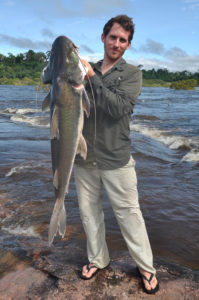Texas A&M graduate Dr. Dan Fitzgerald earns British Ecological Society’s Haldane Prize
Writer: Steve Byrns, 325-653-4576, s-byrns@tamu.edu
Contact: Dr. Dan Fitzgerald, 484-904-3502, danielbrucefitzgerald@gmail.com
COLLEGE STATION — Dr. Dan Fitzgerald has been awarded the Haldane Prize by the British Ecological Society for his work as lead author of a 2017 paper completed during his time as a doctoral student in the Texas A&M University department of wildlife and fisheries sciences, College Station.
The JBS Haldane Early Career Researcher Award recognizes his paper, “Using Trophic Structure to Reveal Patterns of Trait-Based Community Assembly Across Niche Dimensions,” published in the journal Functional Ecology, and available in its entirety at https://besjournals.onlinelibrary.wiley.com/doi/abs/10.1111/1365-2435.12838.
The award-winning paper stemmed from his Texas A&M graduate research exploring community dynamics within a diverse group of rapids-adapted fish in Brazil’s Xingu River, a major Amazon tributary that has recently been impacted by hydroelectric power development.

Dr. Kirk Winemiller, Texas A&M AgriLife Research regents professor in the department of wildlife and fisheries sciences, was Fitzgerald’s major advisor and co-author of the paper along with Drs. Mark Sabaj Perez, curator of fishes at the Academy of Natural Sciences of Philadelphia, Drexel University, and Leandro Sousa, professor at the Federal University of Pará, Brazil.
Winemiller said the paper breaks new ground by establishing a method to assess the role of organism traits for the coexistence of species in local assemblages in the Xingu River rapids. Relationships of functional traits to feeding ecology were assessed by analyzing the stable isotope ratios of fish tissue samples.
According to Fitzgerald, “This approach is useful, because often, we have only museum specimens or laboratory observations of live animals in an artificial setting and can only speculate how the traits of a given species interact with its environment in the wild.”
According to the Haldane Prize background information, only one such award is given annually by the society.
Fitzgerald is the science director at Harpeth Conservancy in Tennessee, where his work centers on the impacts of nutrient pollution in rivers.
For more information, contact Fitzgerald at danielbrucefitzgerald@gmail.com or Winemiller at k-winemiller@tamu.edu .


